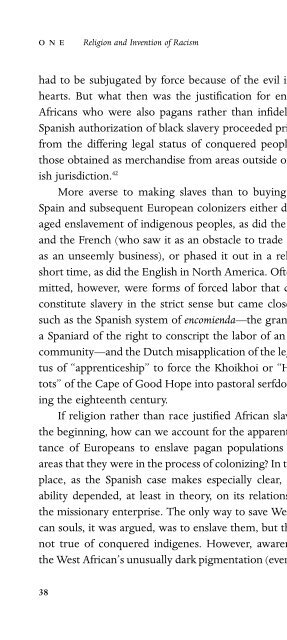Racism - A Short History - George M Fredrickson.pdf - WNLibrary
Racism - A Short History - George M Fredrickson.pdf - WNLibrary
Racism - A Short History - George M Fredrickson.pdf - WNLibrary
Create successful ePaper yourself
Turn your PDF publications into a flip-book with our unique Google optimized e-Paper software.
TWO The Rise of Modern <strong>Racism</strong>(s)<br />
and that inferior breeds would not survive in “the struggle<br />
for existence.” 64 In both the United States and Germany the<br />
eugenics movement, which began in England as a biological<br />
approach to class differences, was eventually applied to<br />
racial and ethnic groups. The belief that government intervention<br />
was required to weed out or neutralize inferior<br />
breeding stock could justify a variety of policies, including<br />
immigration restriction, prohibition of interracial marriage,<br />
the forced sterilization of undesirables, and ultimately<br />
the euthanasia of entire categories of people. 65<br />
Nevertheless, despite all these similarities between the<br />
context and character of emergent racism in the United<br />
States and Germany toward the end of the nineteenth century<br />
and the beginning of the twentieth, the differences are<br />
even more significant. In the first place, the economic and<br />
social competition set off by emancipation involved different<br />
classes or strata of society. The freed slaves in the United<br />
States competed mainly with lower- or working-class<br />
whites. Employers who wished to undermine the ability of<br />
their white workers to organize and bargain from strength<br />
frequently used African Americans as strikebreakers. It was<br />
in this context that a distinctive white working-class racism<br />
took shape on the assumption that only white men were<br />
loyal to their fellow workers. Blacks and Chinese immigrants<br />
(and at times even swarthy newcomers from southern<br />
and eastern Europe who did seem quite white) were<br />
deemed genetically incapable of class solidarity and were<br />
therefore potential tools of exploitative employers. 66 In the<br />
rural South, the many white farmers who were losing land<br />
and independence during the long cotton depression of the<br />
late nineteenth century clung more desperately than ever<br />
86
















